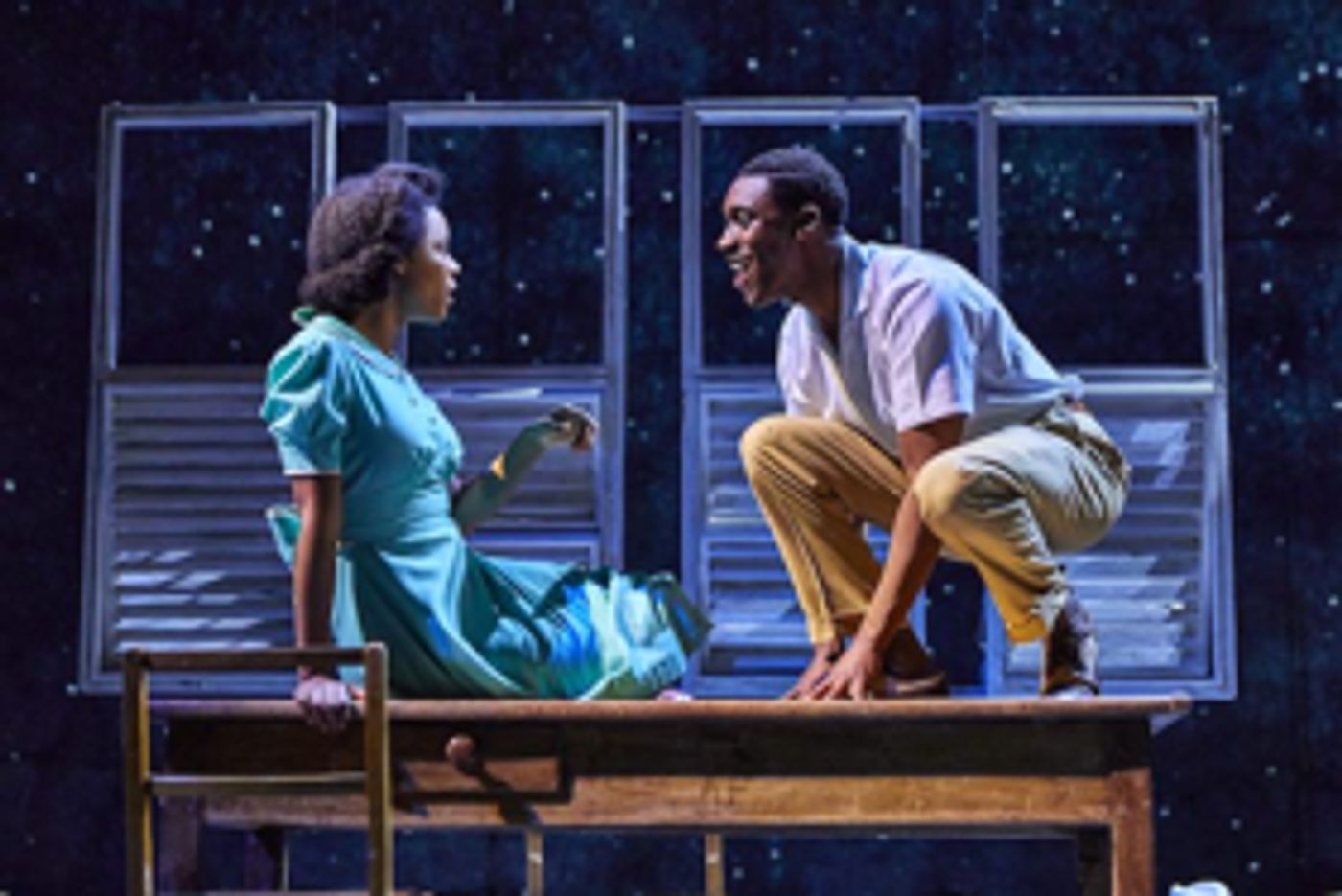Review: SMALL ISLAND, National Theatre

![]() The 2004 prize-winning novel by Andrea Levy, who sadly passed away earlier this year, has been beautifully translated to stage by adaptor Helen Edmundson and NT head honcho Rufus Norris, using thrilling theatrical solutions to honour Levy's epic - and still urgent - tale.
The 2004 prize-winning novel by Andrea Levy, who sadly passed away earlier this year, has been beautifully translated to stage by adaptor Helen Edmundson and NT head honcho Rufus Norris, using thrilling theatrical solutions to honour Levy's epic - and still urgent - tale.
Revising modern history through a few richly drawn individuals, the story follows Hortense, who dreams of escaping Jamaica for England, and who thinks her lighter "golden" skin will equal a golden life; Queenie, who swaps her family's Lincolnshire pig farm for London and a challenging marriage; and Second World War RAF servicemen Michael and Gilbert, also Jamaican natives, whose stories intertwine with the others' in Dickensian fashion.
It's a teeming story with plenty of resonance in how it depicts a complex, changing Britain and the inevitable ghastly treatment of immigrants, but made even more timely by the recent shameful Windrush scandal. Giving voice to those affected feels more necessary than ever.
But this isn't a hectoring drama; far from it. Norris's staging is full of delightfully witty touches - like a character's death signalled by an abrupt descent - and Edmundson's adaptation is surprisingly fleet-footed, despite the huge amount of information it packs in. That does sometimes weigh down the immense first half (earlier set-up scenes could be condensed), yet those careful details pay off in a rich, emotive second half.
There's a clever use of cinema, accentuating the running theme of the gap between expectations and reality; Queenie dreams of a grand romance, Gilbert and Hortense of career opportunities in "the motherland". Jon Driscoll's projections and Paul Anderson's lighting also nimbly guide us between locations and mirror the onstage drama, with both literal and figurative storm clouds and rising waves.
The opening Jamaican hurricane is superbly evoked, and the 1948 sailing of the Windrush is an appropriately blockbuster moment, but both involve minimal props. The Olivier stage is often bare in Katrina Lindsay's design, meaning each element that's introduced has great significance - whether a gutted pig or overflowing bedpan illustrating, respectively, Queenie and Hortense's disgust with their situations, the doors that welcome in lodgers or shut people out, the twisting central staircase of a shared household, or the clothes that rain down when another bomb devastates London.
The empathetic medium of theatre proves ideal for a story in which people often misjudge or misunderstand one another. We meet our main characters and then flash back to learn where they're coming from, so it then jars for us when someone else views them differently - most overtly with the dismissive, small-minded racism, but also in moments like Queenie and Hortense's failures of communication.
Familial separation is another major thread - exacerbated by the losses and uncertainties of war, but also specific to this Caribbean generation. Hortense's mother leaves her to find work in Cuba, and the effects of the subsequent exodus of West Indians like Hortense are still being felt, with many more such separations; that, in itself, is another vital story to preserve and understand while we can.
Leah Harvey does phenomenal work with the prim, prickly Hortense, showing how she's built up this shell are losing loved ones, and how necessary her pride is to maintaining a sense of self: she has been promised a certain life, based on her hard work and sacrifice, and she is determined to get it.
There's an interesting dynamic with Gershwyn Eustache Jnr's swaggering, charismatic Gilbert, who shares Hortense's driving ambition and sense of betrayal, but whose mode of expression is very different; he paints irresistible pictures of the Houses of Parliament as a fairy tale castle, and tries to diffuse conflict with humour.
Aisling Loftus vividly conveys Queenie's warmth, spirit and the tough practicality that helps her survive, and she has a touching bond with her silent, shell-shocked father-in-law Arthur - a poignant turn by David Fielder.
Queenie's husband Bernard is less prominent than in the book, but there's effective work by Andrew Rothney in showing his awkwardness - initially endearing, with comic music cues, later more serious as he too deals with the psychological effects of war, as well as his innate prejudices.
There's also strong support from CJ Beckford as the irresistibly charming, almost mythic Michael; Sandra James-Young as the vibrant Miss Jewel; Johann Myers as Gilbert's louche cousin Elwood, nevertheless shrewd about Britain's shoddy treatment of West Indians; and Shiloh Coke as Hortense's friend Celia, whose effervescence masks familial tragedy.
This is a stirring spectacle that never loses sight of the people at its heart, and an important national story told with all the resources, heart and boundless creativity of our national theatre.
Small Island at the National Theatre until 10 August
Photo credit: Brinkhoff Moegenburg
Reader Reviews

Videos

